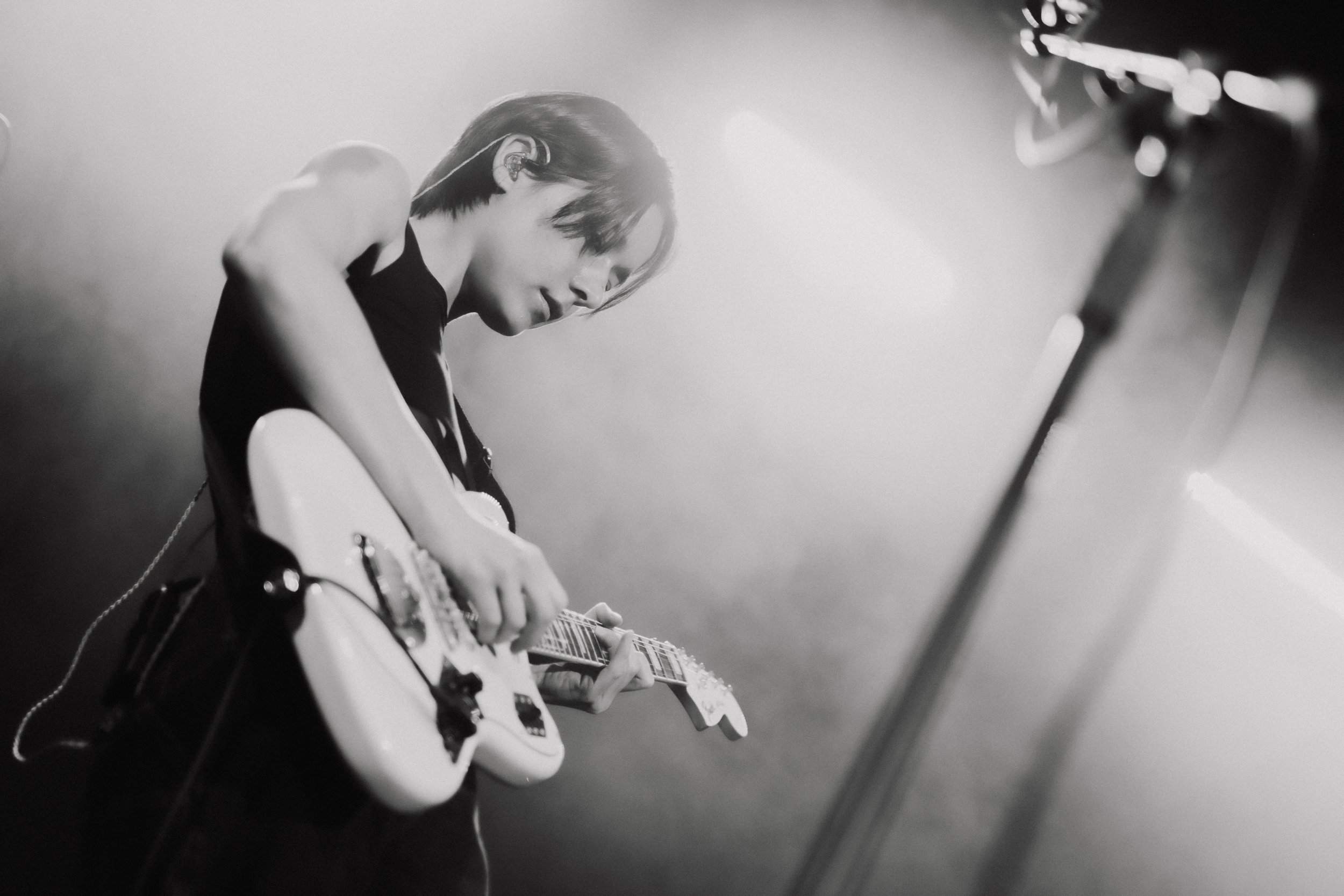Miss Grit on following the cyborg, breaking binaries, and the whiplash of identity
By Serena Zets
Image Credit (in order):
Hoseon Sohn,
NEOMR Media - Marta Ruly
“I’m a living girl / a real living girl / your real living girl / I’m a living boy / a real living boy / your real living boy.”
- Miss Grit, “Follow the Cyborg”
To be a cyborg is to straddle simultaneous identities, an experience that musician Miss Grit understands and explores on their debut album Follow the Cyborg, out earlier this year via Mute. Miss Grit is the artistic project of Queens-based Margaret Sohn (they/she), who has been songwriting and music-making for over five years. When seeking inspiration for the album, Sohn, who is non-binary and multiracial, found themselves repeatedly drawn to the image of the cyborg and its ability to speak to contemporary themes of identity, belonging, community, and resistance.
“I became really entranced by the myth of the cyborg and how it can be really relatable to a lot of groups who are being oppressed in society and how it’s so important to gain autonomy and control over your own being,” Sohn told Hooligan. “[Cyborgs are] able to defy the rules and laws that are set for you by cis white men.” Similarly, Afrofuturist artist and musician Janelle Monae said, “I speak about androids because I think the android represents the new ‘other.’... You can compare it to being a lesbian or being a gay man or a Black woman.”
“I still feel under the foot of the creator. I know it’s an impossible thing to escape,” Sohn said. Despite feeling trapped in the mundanity of the everyday, in Follow the Cyborg, they look to cyborgs to chart a pathway to a potential escape.
“For the way out, I think we have to follow the cyborg. We have to be willing to be disloyal, to undermine. The cyborg is powerful because she grasps the potential in her own artificiality because she accepts without question how deeply it is embedded in her,” writes Jia Tolentino in her essay “Athleisure, barre and kale: the tyranny of the ideal woman,” in which the album borrows its title.
Listening to Follow the Cyborg is an act of radical imagining and future-building that forces the listener to engage with the body of futurist work it’s joining. In a time of AI hype and discourse, Follow the Cyborg enters a canon that includes albums like Monae’s Dirty Computer and fka Twigs Caprisongs alongside books like Tolentino’s Trick Mirror, Donna Haraway’s 1985 A Cyborg Manifesto, Franny Choi’s The World Keeps Ending, and the World Goes, all pieces that mark a much-needed departure from dystopian fear-mongering and an intentional return to thoughtful introspection.
Miss Grit named Bjork’s “lack of boundaries,” FKA twigs’ imagery, LCD Soundsystem’s synths, and St. Vincent’s guitar as influences for this album. Miss Grit joins this group of artists across mediums who all seem to share a belief that to prepare for an unknown future, one must first understand the complexities of themselves. Sohn said they were not thinking about AI or emerging technologies at all while writing the album but rather using their songwriting to look inwards and “find the roots of problems within myself.”
The impacts of these wide-ranging sources come across in all ten of the album’s tracks, creating a unique futuristic sound. Every track is explicitly about the experience of a cyborg but implicitly also about humanity. The lyrics draw from some of Sohn’s own experiences and emotions while transposing these experiences onto a fictional cyborg character. Cyborg imagery is often used to predict or envision an unfamiliar future. Still, Miss Grit subverts the trope by using the cyborg to help them better understand the most familiar terrain: their mind.
The album hits its peak at the titular song “Follow the Cyborg,” which addresses the album’s themes most directly over a droning synth beat. “I’m a living girl / a real living girl / your real living girl / I’m a living boy / a real living boy / your real living boy,” Miss Grit laments on the track before singing in a simultaneously haunting and taunting tone, “follow the cyborg.” These evocative lyrics speak to the unique in-between spot that the cyborg, and other marginalized bodies, occupy in society. The song makes a case for a future beyond binaries; gendered, political, tech-facilitated, or otherwise.
The following track is “Follow the Cyborg,” performed again in Korean, a language they’re learning that is important to Sohn’s identity. The song feels like a very important turning point in the album’s attempt to grapple with and honor many identities. For Margaret, her Korean and American identities, and for Miss Grit, the cyborg’s robot and human identities. “I felt really nervous about including it in the album or even writing it in the first place,” Sohn said about the Korean version of the song. “But I thought I should just include it for myself.”
Sohn wanted the inclusion of this song to address “the whiplash of identity” they feel as a multiracial person. “I’m always thinking about the perspective of how I’m seen … that was something that was holding me back from writing it, but at the same time, I thought it was really important for myself to document how the language and identity were on my mind at the time and how it was reshaping how I thought about myself too.” Interestingly, this song has become one of their favorites to play live. While it’s not something they expected to be a live hit, it’s one that audiences resonate with, whether they speak Korean or not; the vulnerability and risk transcend language barriers.
The album concludes with the most vulnerable track, “Syncing”. At face value, the song is about the complicated and nuanced nature of a cyborg leaving their relationship with their creator, no matter how good or bad it was. Upon deeper listening, it is a fitting allegory for a failing human relationship. It is a song of heartbreak, mourning, fear, and liberation. “The power that the cyborg has in those movies [I drew inspiration from] is that they had a finish line I wanted to get to,” said Sohn about the typical narrative arc of the cyborg. In “Syncing”, Sohn achieves that fate they craved; they can imagine a human achieving a cyborg’s hero’s journey. “And I won’t come back / people change twice a year / and I’m afraid I’m nowhere near / people change twice a year / and I’m afraid I’m nowhere near / where you’ll be when we sync up …” Sohn sings as the album ends. “Syncing” uses robotic language, sounds, and imagery to remind us what it is to be human.
There is a lot that humankind can learn from cyborgs, including how to straddle and embody two identities, how to incorporate technology into our lives while critiquing its potential dangers, and how to resist laws and authorities trying to exert control over its most marginalized subjects. Follow the Cyborg reveals a lot to be learned from Miss Grit, too; how to resist binaries; how to be experimental and brave in our artistic creation; how to ask ourselves hard questions, and how to let others listen to our attempts to answer.
Six months after the album’s release, Miss Grit’s journey is onto the next phase. They’re currently spending the summer enjoying music by working on new remixes and attending a lot of live shows to get inspiration for their upcoming tour with Nation of Language. “Playing live or writing music is a huge mental game for me, and it’s not only enjoyable. So finding moments to have fun with other people’s music is a really nice way to get out of my own head,” said Sohn. “[Remixing] has been a really good practice to keep production skills up and also to have fun with music, something that isn’t always guaranteed.” They just remixed Depeche Mode’s “Ghosts Again” as part of the iconic band’s recent Ghosts Again (Remixes) album.
Miss Grit is also working on a new project. Though it has no announced release date, fans of Follow the Cyborg have much to look forward to. Sohn said that they listen to, consume, and devise music in albums rather than as individual sums adding to a larger whole. The idea of a concept album always called to them, and the strength of the cyborg metaphor allowed them to commit to the idea fully. However, they hope their next album can be a bit less concealed and more personal; they have a lot left to think, write, and sing through. Based on this strong debut, whatever concept or experiences they explore in their next album will surely provoke, emote, and excite.



